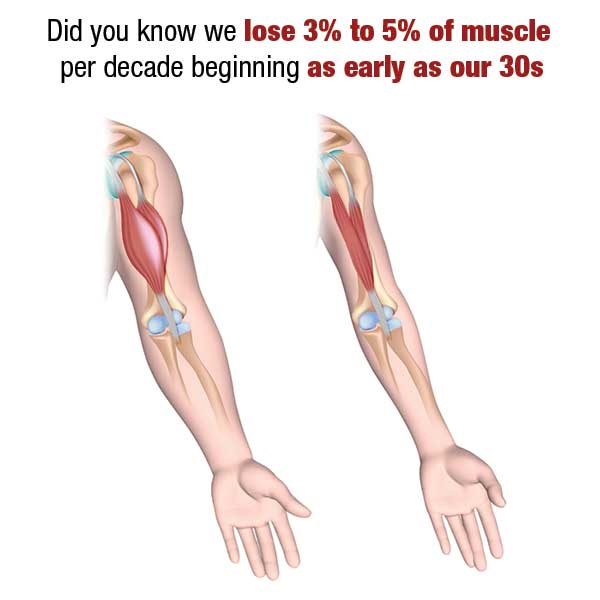Why healthy muscle is critical to preventing disease and enhancing your health – particularly as you get older
You have more than 600 muscles in your body. They help you move, lift things, pump blood through your body, and even help you breathe. There are voluntary muscles (skeletal muscles) that you control and involuntary muscles (smooth muscles) that you don’t control. Your heart is also a muscle, a specialized type of involuntary muscle that pumps blood through your body.
When we think about muscle, we often only think about it through an athletic lens or aesthetic lens. We imagine bodybuilders or athletes and the role that muscle plays in fueling their body’s ability to perform. Or we think about people who lift weights so they can strut up and down the beach in the summer to catch admiring eyes.
Muscle is indeed incredibly important for athletic activity and lean muscle does undoubtedly give the body an aesthetic appeal, but muscle is so much more important than that – and this is a very under-appreciated fact.
Muscle plays a central role in whole-body protein metabolism, which is particularly important in the response to stress. Furthermore, abundant evidence points to a key role of altered muscle metabolism in many common pathologic conditions and chronic diseases.
Maintenance of the protein content of certain tissues and organs, such as the skin, brain, heart, and liver, is essential for survival. These essential tissues and organs rely on a steady supply of the amino acids in protein via the blood to balance the persistent rate of protein breakdown that occurs in all tissues. Most of the amino acids that you consume through protein get absorbed into your muscles and they become the source for the rest of your organs.
Healthy muscles let you move freely and keep your body strong. They help you to enjoy playing sports, dancing, walking the dog, swimming, and other fun activities. And they help you do those other things that you have to do, like making the bed, vacuuming the carpet, or mowing the lawn. Strong muscles also help to keep your joints in good shape. If the muscles around your knee, for example, get weak, you may be more likely to injure that knee. Strong muscles also help you keep your balance, so you are less likely to slip or fall.
But muscles also play a critical role in preventing disease and illness. A stressed state, such as that associated with cancer or traumatic injury, imposes greater demands for amino acids from muscle protein breakdown. Physiological responses necessary for recovery may include the accelerated use of proteins in the liver, in immune function, and in wound healing.
Beginning in our 30s, we naturally begin to lose muscle mass and function. However, the latest science is showing that this doesn’t need to be so and that we can maintain and even increase healthy muscle as we get older. With the right nutrients and a regular resistance training program, we can improve muscle health to maintain strength, mobility and to fight disease well into our golden years.
MEND Regenerate contains a blend of fast absorbing and long absorbing proteins, 5 grams of BCAAs, 5 grams of glutamine, 1.5 grams of HMB and 1.5 grams of creatine. One of the key nutrients that we’ve added to Regenerate to help with protein absorption is an enzyme blend called protease. These select enzymes help your body break down protein chains into amino acids, improving the absorption of these essential nutrients. Clinical research has shown protease to increase BCAA retention levels by 250%, nitrogen levels in muscle by 32% and overall amino acid plasma levels by 100%. Researchers also found all amino acids, essential conditionally essential, including branched chain amino acids, are released in greater amounts when protein is digested with protease.
Put simply, there is no better product on the market of muscle health than MEND Regenerate.



